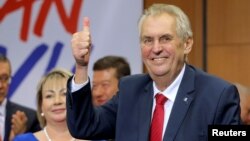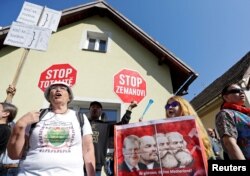When the United States, Britain and France bombed Syria earlier this month, Czech Prime Minister Andrej Babis showed support for his Western partners one day before rowing back the next.
The military strike turned from "inevitable" to an act described as changing nothing after Babis was rebuked by the far-left Communist party, showing the fine line the billionaire businessman is walking as he tries to form a government.
Babis is aiming for a pro-Western administration but political fragmentation in October's election means he needs the pro-Russian Communist party to either support it or abstain, ending the party's pariah status since communism fell in 1989.
The Communists and President Milos Zeman will push Babis — whose ANO party is pro-EU and pro-NATO — toward a softer tone on Moscow, but he is not expected to move far despite the fall of his first minority cabinet in a confidence vote in January.
Shunned by most parties over charges of fraud in a 2-million-euro EU subsidy case he says is a plot, Babis is now negotiating a coalition with the center-left Social Democrats that would also lean on Communist votes.
The Communists' limited role, with no cabinet seats, would not bring the kind of changes to core policies that have sparked conflict between the EU and Hungary and Poland, but would still anger many Czechs who suffered under their rule.
The current Communist rank and file, with average age well over 70, are nostalgic about life behind the Iron Curtain, and the party pledges to fight global capitalism and leave NATO.
"Security threats do not come from the east, security is under threat from those who commit aggressive attacks against sovereign countries in violation of international law as the United States, Britain and France have done in Syria," party leader Vojtech Filip said at a party congress on April 21.
Foreign Policy
The Communists would like to end EU sanctions on Russia and follow Moscow's line on Ukraine: party officials have traveled to separatist-controlled Donbass and Crimea.
They oppose Czech participation in military missions lacking U.N. approval — which means any opposed by Russia as permanent U.N. Security Council member.
The Czechs have hundreds of troops in Afghanistan, Iraq and elsewhere, a number Babis's cabinet aims to boost this year by several hundred. The Czechs also plan to help protect NATO airspace in the Baltic.
"We have an elevated sensitivity to any pressure for escalation of tensions toward the post-Soviet region, we would have to react very strongly to anything like that," Communist member of parliament Richard Dolejs told Reuters.
The Communists also criticized Babis's government for handing a suspected Russian hacker in March to the United States, and for expelling Russian diplomats after the attack on a former Russian spy in Britain.
Falling Support
It is unclear what concessions the Communists would secure from the two coalition parties, but their influence will be limited by their waning popularity. They scored their worst post-Communist election result, 7.8 percent, in October, bleeding half of their votes to the far-right and to Babis.
"They have become very pragmatic over the last two decades," said Lubomir Kopecek, political science professor at the Masaryk University.
"The request to leave NATO does not appear in the talks...A large part of the party's elite wants to experience some recognition at the end of their political careers."
A senior source from one of the negotiating parties said the Communists would be satisfied with positions in administration and state-owned firms. In foreign policy, the government could seek support elsewhere in parliament.
Dolejs said the party wanted to have a say on issues such as social benefits.
"Tolerating the government will raise our legitimacy. We see a chance to show our voters...that we can get at least a bird in the hand."
More Trouble Elsewhere?
Involving the Communists is not a sudden turnaround. They have been part of regional governments and former party members, who include Babis himself, have held prominent jobs.
For the center-right, the party remains a no-go. "Andrej Babis is fulfilling his dream at too high a cost," Petr Fiala, leader of the Civic Democrats, said in a post last week.
But elsewhere views are finely balanced. A Median agency survey last month showed 45 percent of Czechs could accept a Communist-backed government, while another 41 percent reject it.
Thousands protested in March after Zdenek Ondracek, a Communist lawmaker who had been in a police unit that beat up pro-democracy protesters in the 1980s, was elected to lead a police inspection oversight body. Babis withdrew his support and Ondracek resigned.
Within the Social Democrats, there is more debate about the risks of joining Babis, due to his legal problems and visions of streamlining political decision-making, than the Communists.
And Social Democrat leader Jan Hamacek said on Saturday he was more worried about the rising far-right, anti-Islam, anti-NATO and anti-EU party SPD, which won 10.6 percent of the vote.







